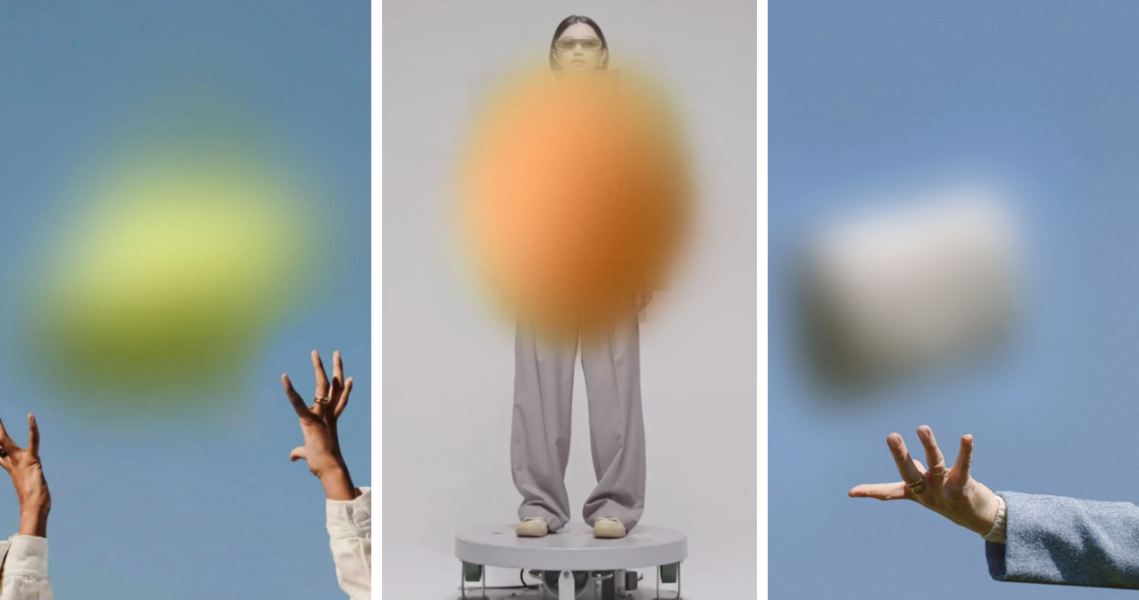Thirteen-year-old accessories brand Cuyana launched, Made With Air, labeled as “the world’s first true zero-impact collection,” on April 1. Its announcement led to the brand’s social accounts seeing a 130% increase in content interaction and an over 100% increase in accounts engaged, compared to its other campaign activations.
April Fool’s is tricky for brands to navigate. Lowlights include cringe product ideas and forced humor-focused campaigns. This year, Cuyana got in on the holiday, with an aim to pair the concepts of greenwashing and de-influencing to make an impact in-store, on its social channels and through an email marketing campaign. It teased the “Made with Air” campaign in the days leading up to April 1 in its stores, through campaign imagery, and on social media, via its own accounts and partnerships with influencers.
In the marketing, the brand described the Made With Air collection as its lightest, airiest, most sustainable clothing offering yet. Of course, an item made from air cannot exist — which the brand explained when it revealed through its marketing channels that it was not, in fact, launching a collection. Over the last 10 years, greenwashing has been rife in the industry. Both the E.U. and the U.K. are now announcing measures to stop greenwashing in consumer product categories.
“Brands have begun taking the position that they know what’s better for the environment, but it’s still within the context of a high-growth business model, which is a bit hypocritical. They’re saying that they know what the priorities are, while they’re focusing on growth,” said George Harding Rolls, campaign manager at Changing Markets Foundation, a Dutch non-profit formed to expedite solutions to consumer product sustainability challenges.
“In this case, it felt very important to show and talk to the industry about how greenwashing isn’t a good path forward, because it builds consumer distrust between brands and consumers,” said Shilpa Shah, co-founder of Cuyana. “It desensitizes consumers overall to the topic of sustainability which is contradictory to what we want. The only way to really break through that noise was to show them how susceptible one can be to these messages.”
According to Shah, the initial campaign led a few customers to add the “air” product to their carts. The product page imagery showed a fuzzy, colored cloud of air surrounding the model.
“We were very intentional about not saying ‘April 1’ [within the campaign] and just doing it as a greenwashing marketing campaign like the ones we see in the industry, and people totally bought into it,” Shah said. Apart from the increase in social engagement, the brand saw double its average number of site sessions on the day of launch, driven by a brand email. In fact, the site saw more sessions than during the brand’s one-time archive sale.
“In the marketing world, we’ve been told that people don’t read anymore, but [in this case], more people engaged and more people read than with any other thing we’ve done,” Shah said.
For the campaign, Cuyana teamed with eight sustainability-focused influencers including actresses Nathalie Kelly (1.5 million Instagram followers), Janina Gavankar (206,000 followers) and Kayla Ewell (1 million followers). The influencers supported the campaign organically and were not paid to post. They posted a photo of themselves wearing the blurry fake “air” garments in their photos, paired with a caption about greenwashing. “The part we added here is the humor; you don’t see a lot of humor around sustainability,” said Shah. “That, and having influencers actually wearing the air, made it that much more effective.”
Cuyana respun the concept of de-influencing by enlisting influencers to educate their followers on greenwashing and to give greenwashing practices — rather than a single product or brand — a negative review.
Instead of simply being paid to post, influencers were also encouraged to contribute to the campaign and its imagery. “Our approach is, ‘Let’s not pay you for your influence, but let’s pay you for your intelligence,’” said Shah. “A lot of times when you make influencer requests, it feels fake and artificial and not intelligent. Because this was coming from a place of intelligence, the influencers found that their community was applauding their posts, versus thinking, ‘Oh, you’re selling to me.”
Shah said the learnings from the campaign could help brands avoid greenwashing in the future by showing the power of sustainable fashion influencers to educate and bust myths.
“We learned a lot about how people who have worked hard to establish their community, especially in the sustainability space, haven’t been incentivized the same way that regular fashion influencers have by bigger brands,” Shah said.




